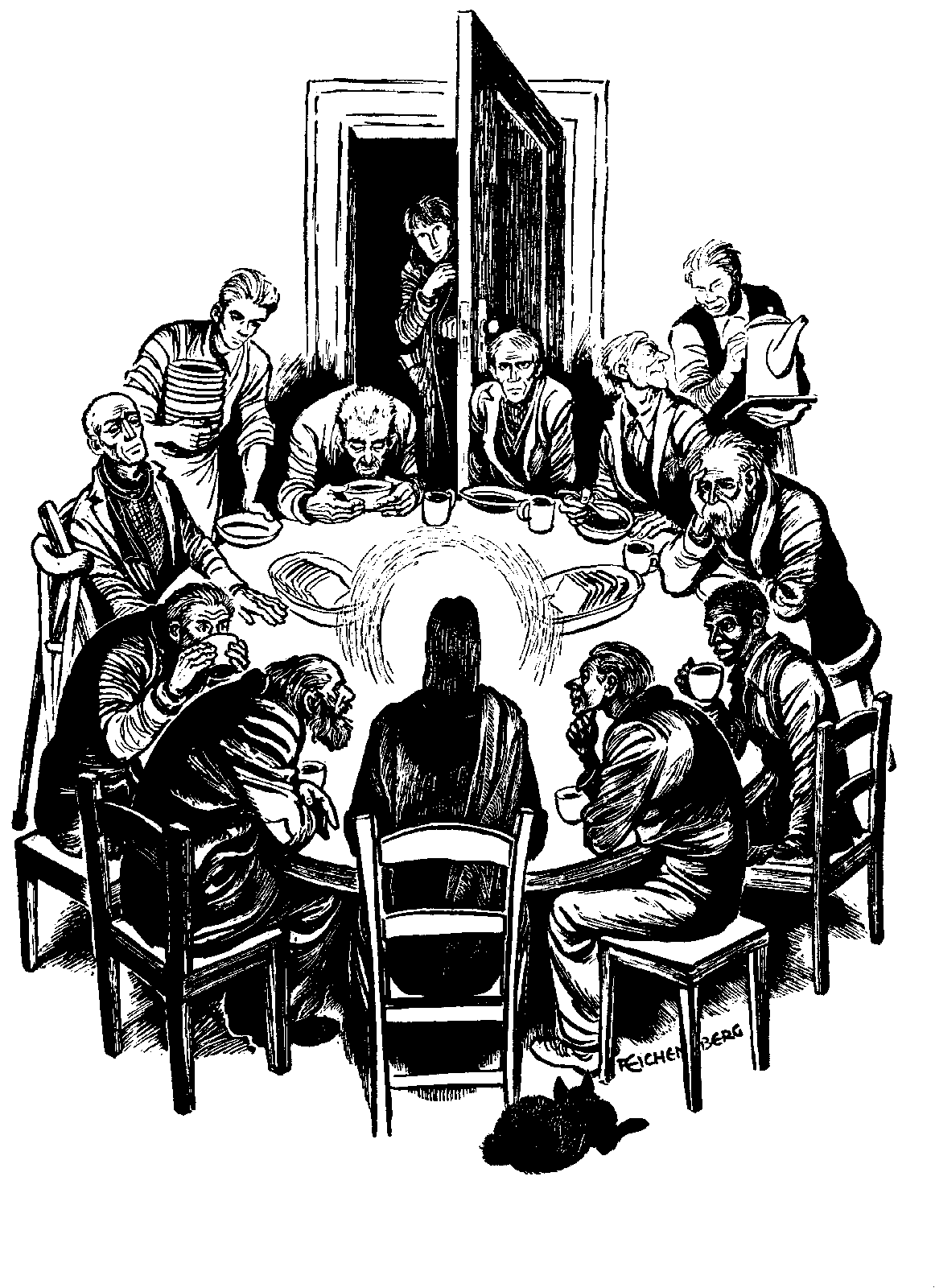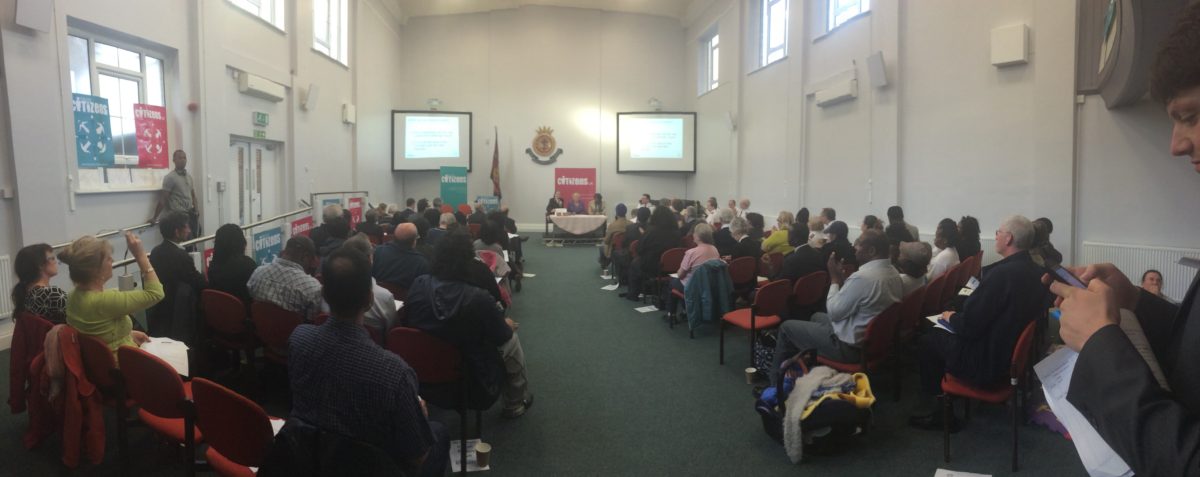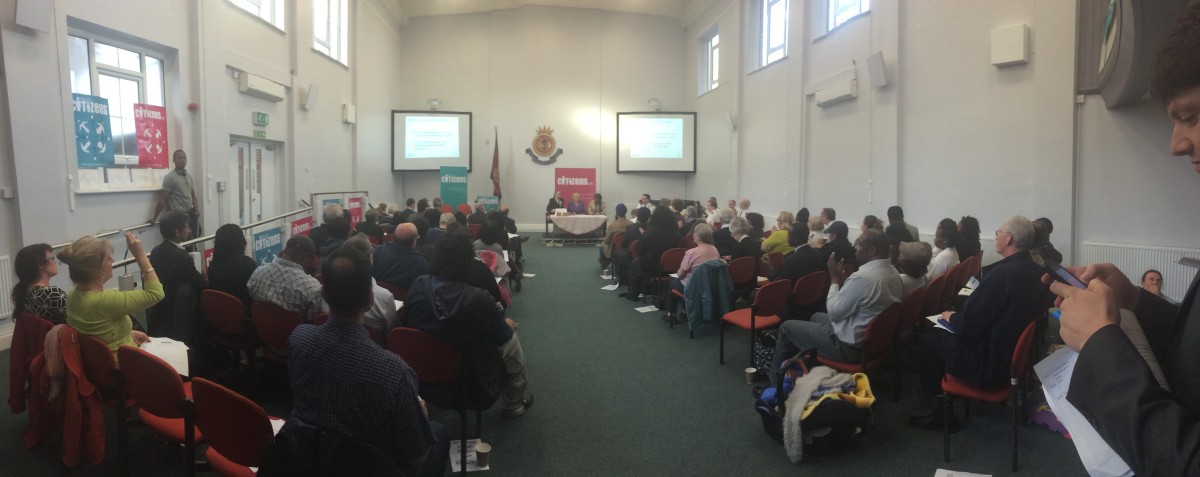Major Jonny Smith hosts a conversation on Facebook Live on 7 May 2020 with three Salvation Army corps leaders – Captain John Clifton (Ilford), Major Estelle Blake (Oldham Fitton Hill) and Major Nick Coke (Raynes Park). They explore themes related to mission, justice, community organising and the local church through stories of hope and transformation.
Tag: homelessness
Meeting Christ in a night shelter: a post-Easter reflection on a Maundy Thursday evening

For the last eight years at Ilford Salvation Army we have run a night shelter over the winter season. This typically runs from the first week of December to the first week of March, sleeping 28 people every night in the upstairs hall of our church building in Clements Road. For the last couple of years, we have been working on an initiative called Project Malachi to develop a ‘pop up hostel’ using a modular, re-deployable building (like shipping containers). We are excited that manufacturing of the units has begun, and the building is scheduled to be completed later in the year. However, we were hoping it was going to be completed sooner but in light of some delays we pledged to keep the shelter open until people move in to Malachi. This was a big commitment for the church and volunteer team.
One of the unexpected blessings of running the shelter on an extended basis this year has been that it has been open over Easter. Because the shelter is typically open over Christmas, we make natural associations between that festival, the homeless Jesus and the shelter ministry. This year, we had the opportunity to be more closely attentive to the grounding of this work in the Easter story. An example of this was on Maundy Thursday.
We had scheduled to watch the Passion of the Christ followed by a Love Feast. However, the shelter was slightly low in numbers for volunteers at the shelter due to some having commitments at their own churches. With a low turnout to watch the film, we thought that a better use of our time would be to help with the shelter, and then gather later for the Love Feast. Before opening shelter, we gathered for prayer and shared a reading from John 13 and the new commandment ‘that you love one another. Just as I have loved you, you also should love one another. By this everyone will know that you are my disciples, if you have love for one another.’ This also prefigured the Love Feast later in the evening.
The evening was a little bit chaotic, with some people ‘under the influence’ but the team embodied that new command with meekness and strength. We fed the hungry – people desperate to eat the food (which had been kindly prepared by Muslim colleagues offsite and then delivered to the shelter); we gave drink to the thirsty – teas, coffees and juice quickly consumed; we clothed the naked – one of the men was needing a new pair of work boots after they had been stolen from where he stored them; we welcomed the stranger – a Salvationist from Ghana visited the Corps for the first time; we visited the imprisoned – one of the guests was discharged to shelter inappropriately by probation services (an issue we are having to battle hard to resolve); and we visited the sick – late in the evening, a lady was brought to us because ‘The Salvation Army will know how to help” – she was suffering with dementia and was found wandering in a park after ‘escaping’ from her supervised accommodation. All the members of the team worked together to help everyone who was in need. It was an interesting evening but, nevertheless, a blessed one!
At around 9:30pm, once things had quietened down a bit, some of us – both volunteers and guests – gathered in the main hall for the Love Feast. As we sat together, readings were shared from Scripture to help us focus on the love that God has for us, and our own need to be able to love more, and better. As we ate and drank, I found my attention drawn to my own vulnerability and frail human condition, and the way that I embody the conditions found in Matthew 25:31-46, inasmuch as they were visible in people who would be sleeping in the shelter that evening.
Without diminishing the particularity of my, or their, situation, our common humanity – humanity common with Christ, was realised yet again: “I give you a new commandment, that you love one another. Just as I have loved you, you also should love one another.”
It is in this sense that we find the work of the shelter, and any other enactment of embodied compassion – to be a practice of discipleship. Through our simple desire to be with and imitate Him, we are shaped more and more into His likeness.
Give, Teach, Train: how one Salvation Army Corps is organising for justice
This article first appeared in Explore Magazine 2016 and is published with permission.
A famous proverb says:
‘Give a man a fish and he’ll eat for a day. Teach a man to fish and he’ll eat for a lifetime.’
Recently, we’ve added a third part:
‘Train a man to organise and his community will feast for ever.’
However, in our part of London, the problem isn’t about having fish to eat – it’s about having a home to live in. Soon after Naomi and I arrived at Ilford Salvation Army, I met a man called Mustafa who had been an accountant. When I met him he had been on the street for a couple of days and came to us for help. What followed was a crash course in navigating bureaucracies. I met Mustafa at around 10 am. It was around 11 pm when I had to say to him: ‘I’m sorry, Mustafa. Here’s a sleeping bag. Come back in the morning.’
I had never felt so powerless in my life.
Power – which in community organising is defined as the ability to act – is the fundamental component of bringing about any sort of change you want to see. We could only make as much change as we had the power to compel.
Give a man a fish – Give a man a bed
People often come to Ilford Salvation Army because we are immediately next door to the council’s Housing Advice Centre. They come to us if they haven’t got the answer they wanted. Too often we can just give someone a sleeping bag and make a referral to set them on the path to finding appropriate support, as with Mustafa. After meeting him, however, in November 2011, we discovered a group of other Christians looking to establish a winter night shelter, following the deaths of two rough sleepers the previous year. Somewhere was needed to host the shelter, and with a large upstairs hall used only for storage, we offered our building as a venue.
Within weeks, 25 men and women were sleeping in sleeping bags on foam mats in our upstairs hall. Soup was served each evening and donations of clothing given out. It was basic, but it kept people alive. Over four winters, over 300 people have stayed at the night shelter. Each guest can tell their own story of the chain of events that led them to sleeping rough on the streets.
The shelter is only possible because of the commitment of over 150 volunteers from a wide range of backgrounds. Salvationists are joined by members of other churches: Catholics, Baptists, Pentecostals, Methodists and non- denominational. We are joined by people of other faiths and none. The current volunteer team includes Muslims, Sikhs, Jews, atheists and agnostics. We are a diverse community brought together to meet a common need. I’ve experienced more meaningful unity of the Body of Christ at the night shelter than I have in any other ecumenical setting.
Teach a man to fish – Help him find a home
A couple of years into the life of the night shelter, we realised that we shouldn’t just be giving people food and a bed. Lifesaving though this was, the night shelter needed to be a base for people to get their lives back on track and move on to a home of their own. We began convening a meeting between different local organisations to discuss what options there were for each person.
Unfortunately not everyone can move on. Last winter less than a fifth of our guests moved on to a more stable environment, whether rehab, hostel or flat. For some, their options are limited by having no recourse to public funds. For others, the obstacle is the lack of genuinely affordable housing in our borough. With the lowest stock of council housing of the London boroughs, people in Redbridge are dependent on private landlords. Rents are much higher than the local housing allowance, which means that people we have worked hard to build relationships with are moving out of the borough. This is true not just for people staying in the shelter, but also for families at our toddler group, and people who consider The Salvation Army their church. Suddenly, we all became aware that the housing crisis isn’t affecting just a niche group of homeless people. It is affecting our families and our friends. It is ripping the heart out of our community.
Train a man to organise – Building a community
Ilford Corps is a member institution of Redbridge Citizens, the local chapter of community organising alliance Citizens UK. Citizens UK is an alliance of over 350 schools, churches, mosques, synagogues, unions, youth groups and universities committed to social justice and the common good. Self-identifying as a ‘power organisation’, Citizens UK trains local institutions in the practice of community organising, so that with their neighbours they have the power to challenge politicians, councils and businesses. By building power, people can change their neighbourhoods, cities, and ultimately the country for the better. At Ilford Salvation Army, we realised we needed to get serious about organising if we were to make the change we wanted. The local elections of 2014 provided an opportunity to take action.
On Tuesday 6 May 2014, 93 citizens met at Ilford Salvation Army hall to hold a public negotiation with the three electoral candidates for leader of Redbridge Council. The three councillors were pressed by this diverse assembly to make commitments to pay a living wage to all care workers, create a private landlords register, explore the possibility of a Community Land Trust (CLT) in the borough, and to meet regularly with Redbridge Citizens to work together in addressing the issues raised at our assemblies.
A lot of hard work had gone into the assembly: negotiations with politicians; a script carefully crafted; conversation convincing members to turn up. This was just the beginning. We didn’t ask the politicians to do something for us; we asked them to do something with us. Months later, a small delegation met the newly elected Leader and Deputy Leader of the Council to follow up on their commitments, including exploring developing a community land trust (CLT).
A CLT is a way to develop genuinely affordable housing by taking the land into the shared ownership of the community. This removes the inflationary considerations of the land value from the cost of rent or purchase, meaning they can instead be linked to the median income of a given area. Stepney Salvation Army, through Citizens UK, had already been involved in pioneering the first urban CLT in the UK, and we believe that developing one within our borough will benefit local people struggling to find affordable places to live.
After months of public actions, we engaged with the borough’s Fairness Commission and succeeded in getting them to recommend that two parcels of land be allocated towards large-scale CLTs. In November 2015, we went to a council meeting at the town hall. We filled the public gallery with 80 of our members and stood together to table a question to seek the Leader of the Council’s endorsement of the CLT. He committed to attending another assembly in February 2016 where we would celebrate signing up 300 new shareholders of the CLT – the #Pound4Power campaign. The night shelter guests have all signed up as shareholders, and one of the guests at the night shelter has signed up nearly 60 new shareholders on her own!
Conclusion
Matthew 25:34-36 says: ‘Come, you that are blessed by my Father, inherit the kingdom prepared for you from the foundation of the world; for I was hungry and you gave me food, I was thirsty and you gave me something to drink, I was a stranger and you welcomed me, I was naked and you gave me clothing, I was sick and you took care of me, I was in prison and you visited me’ (NRSV)
A key aspect of these verses is that the situation is transformed. For example, the one who is hungry is fed. In other words, the homeless person gets a home – not homeless any more! What if we go a step further and recognise that one of the roots of each of these situations is the incapacity to act? Perhaps it’s also appropriate to say, ‘I had no power, but you trained me how to take it back’, so that there’s a fighting chance in that struggle ‘against the rulers, against the authorities, against the powers of this dark world and against the spiritual forces of evil in the heavenly realms’ (Ephesians 6:12 NIV).
My dream for Ilford Salvation Army is that it will not just be a community where lives are saved (though it is), where a community comes together to meet a common need (though it is) and where those sleeping rough come to realise that they are valued and loved by our community (though, again, it is) – but that it will be a place where people find the capacity to act – that power might be built.
Continue reading “Give, Teach, Train: how one Salvation Army Corps is organising for justice”
A nightshelter to a housing campaign: I had no power but you showed me how to take it back
By John Clifton
A week on Thursday, Ilford Salvation Army will open its night shelter for the 5th consecutive winter. During this time, hundreds of people have stayed in the shelter, which accommodates 28 people per night. For those 93 nights, during the coldest part of the year, the Corps building becomes ‘home’. However, we’re very aware that sleeping on a camp-bed in our upstairs hall doesn’t constitute fullness of life. Let’s take a look at Matthew 25 again:
“Come, you that are blessed by my Father, inherit the kingdom prepared for you from the foundation of the world; 35 for I was hungry and you gave me food, I was thirsty and you gave me something to drink, I was a stranger and you welcomed me, 36 I was naked and you gave me clothing, I was sick and you took care of me, I was in prison and you visited me.”
…a Salvationist, telling my own story…
Guest post from Panna Simon
When I first came to The Salvation Army in 2012, I was 8 months pregnant and had just been made homeless. I had moved into a privately rented flat that had turned out not to be fit for human inhabitance. There was mould, severe stru ctural problems, no heating and dodgy electricity. It was basically built on top of a garage. This was meant to be the place that I would bring my son back to.
ctural problems, no heating and dodgy electricity. It was basically built on top of a garage. This was meant to be the place that I would bring my son back to.
I reported this to the council who condemned the property straight away but then wouldn’t help me with further accommodation because I was in-between an application changing from jobseekers allowance to maternity allowance. I worked really hard to find a flat and then was able to get some money together for the deposit. I moved in on the Monday. I went in to labour on the Tuesday. Just in time! Continue reading “…a Salvationist, telling my own story…”


